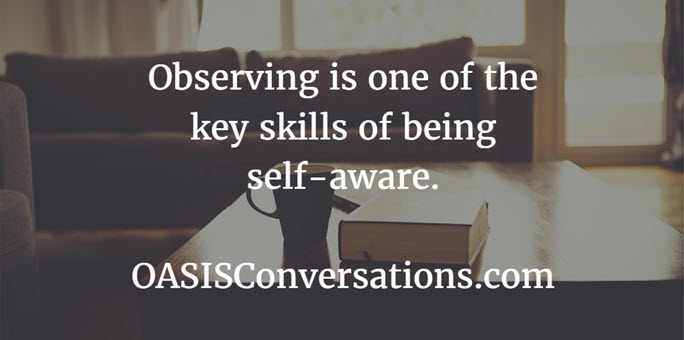 [Excerpted from OASIS Conversations: Leading with an Open Mindset to Maximize Your Potential]
[Excerpted from OASIS Conversations: Leading with an Open Mindset to Maximize Your Potential]
Observing is one of the key skills of being self-aware. Years ago, I was just like a “bobbing head.” In my focus on being efficient, I was moving so fast that I was not aware of my sensations. I quickly made and acted on my assumptions. Many of the executives and others I work with currently are experiencing life the same way.
By becoming aware of what you observe, you are more likely to remember that others notice different things and interpret situations differently. This is an important first step to communicating effectively with people who have different experiences than you do— which is everybody! I encourage you to notice and practice sharing your observations with your family members. I am forever amazed by how what appears obvious to me is not the same, for instance, as what my daughter is observing.
Benefits of identifying observations and then separating them from assumptions include:
- You can catch yourself assuming and jumping to conclusions without a basis.
- You know that both you and the person you are talking with are talking about the same thing.
- You know how to begin a conversation without making the other person defensive.
- When you use observable data in conversations, it increases understanding and creates more trust in your relationships.
- The process of noticing supports you in being more present and mindful.
During your workday, take a moment to ask yourself, “What did I observe that is leading me to this assumption?” For example, if you conclude that a colleague is ignoring you, can you identify what you observed that made you think this? Perhaps you noticed your colleague talking to someone else at a meeting or you did not receive a call from him that you expected. You may consider multiple explanations for not receiving the call. Maybe the person called your office number rather than your cell phone. Perhaps you did not pick up your messages, the person left you an e-mail, or you did not get a message that someone was supposed to deliver. Were you clear about your expectations? Was the person anticipating that you would call him? Of course, the person could really be ignoring you…! Practice describing the observable data on which you are basing your assumptions.
